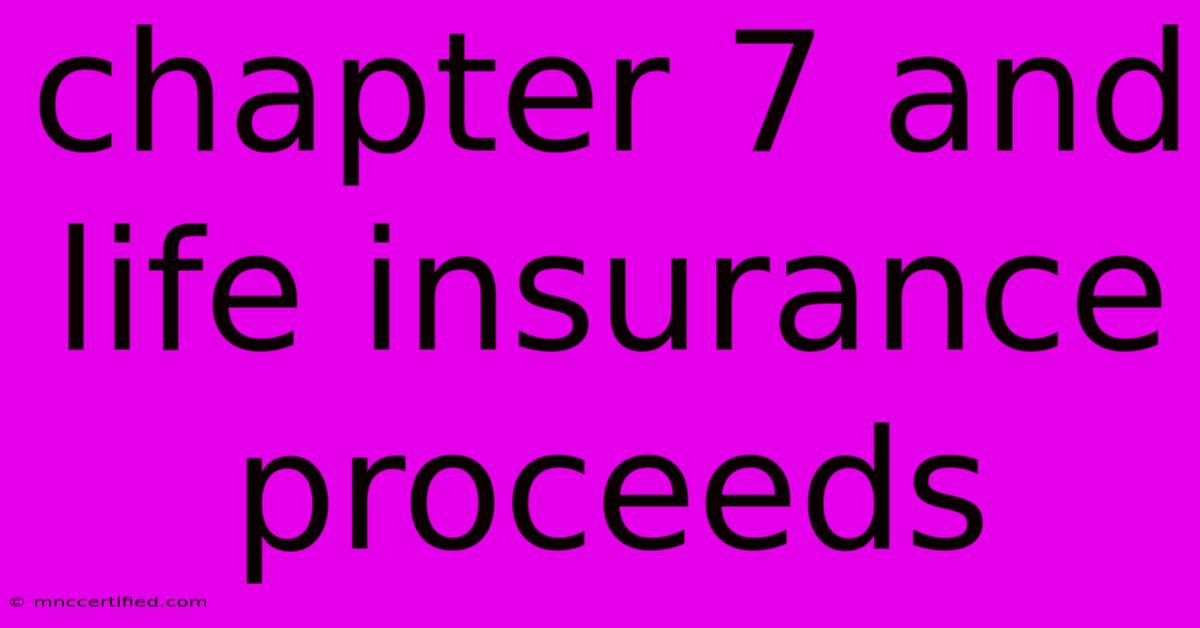Chapter 7 And Life Insurance Proceeds

Table of Contents
Chapter 7 Bankruptcy and Life Insurance Proceeds: What You Need to Know
Facing bankruptcy can be an overwhelming experience, and navigating the complexities of life insurance proceeds in this situation adds another layer of confusion. This guide will break down the relationship between Chapter 7 bankruptcy and life insurance proceeds, helping you understand your rights and obligations.
Understanding Chapter 7 Bankruptcy
Chapter 7 bankruptcy is a legal process that allows individuals and businesses to eliminate most of their debts. This involves selling off non-exempt assets to repay creditors and then receiving a discharge that eliminates remaining debts.
Life Insurance Proceeds: An Overview
Life insurance policies are designed to provide financial security to beneficiaries upon the death of the insured. This payout, known as the death benefit, can be a crucial source of financial support for loved ones.
The Relationship Between Chapter 7 and Life Insurance
The question of whether life insurance proceeds are considered assets subject to Chapter 7 bankruptcy is a crucial one. The answer lies in the ownership of the policy and the timing of the insured's death.
Scenario 1: Policy Owned by Debtor
- Death Before Filing: If the insured dies before filing for Chapter 7 bankruptcy, the death benefit is considered an asset of the estate. The proceeds will be collected by the bankruptcy trustee and distributed to creditors.
- Death After Filing: If the insured dies after filing for Chapter 7 bankruptcy, the death benefit is generally not considered an asset of the estate. However, if the policy was taken out with the intent to defraud creditors, the proceeds could be subject to the bankruptcy.
Scenario 2: Policy Owned by Beneficiary
- Policy Ownership: If the life insurance policy is owned by someone other than the debtor (such as a spouse or child), the death benefit is generally not considered an asset of the debtor's estate.
Key Considerations
- Exemptions: Certain states have exemptions that protect life insurance proceeds from bankruptcy proceedings, even if the debtor owns the policy. Check your state's laws for specific exemptions.
- Irrevocable Beneficiary: Designating an irrevocable beneficiary can offer greater protection for the proceeds. This means that the beneficiary cannot be changed without the beneficiary's consent.
- Intentional Fraud: If a policy is taken out with the intent to defraud creditors, the bankruptcy court may deem the proceeds subject to the bankruptcy.
Navigating Life Insurance and Chapter 7
It's essential to consult with a qualified bankruptcy attorney who can assess your specific situation and provide guidance on:
- The ownership of your life insurance policies
- Exemptions that may apply in your state
- Potential risks of fraudulent intent
- Strategies for protecting your beneficiary's interests
Conclusion
Understanding the relationship between Chapter 7 bankruptcy and life insurance proceeds is crucial for protecting your financial future. By understanding the nuances of ownership, exemptions, and the timing of the insured's death, you can navigate this complex situation with greater clarity and protect the interests of your beneficiaries. Always seek legal advice from a qualified bankruptcy attorney for personalized guidance and informed decision-making.

Thank you for visiting our website wich cover about Chapter 7 And Life Insurance Proceeds. We hope the information provided has been useful to you. Feel free to contact us if you have any questions or need further assistance. See you next time and dont miss to bookmark.
Featured Posts
-
Premier League Fulham Dominate Palace 2 0
Nov 10, 2024
-
Bondo 422 Fiberglass Resin Repair Kit
Nov 10, 2024
-
Texas Tech Vs Colorado Live Score Updates
Nov 10, 2024
-
Is Buying An Rv Lot A Good Investment
Nov 10, 2024
-
Live Score Crystal Palace Vs Fulham Premier League
Nov 10, 2024